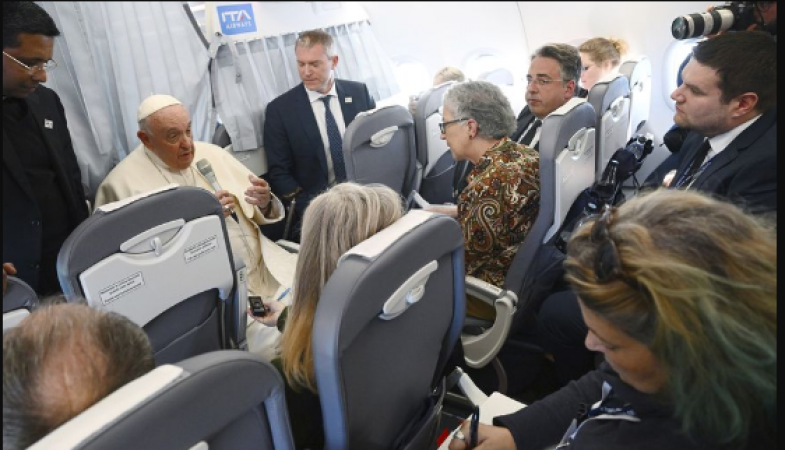
Vatican city: Pope Francis announced on Sunday that negotiations to return artefacts from the colonial era that the Vatican Museum purchased from Canadian Indigenous peoples were in progress. He also expressed a willingness to return other problematic artefacts in the Vatican collection on a case-by-case basis.
Francis said, "The Seventh Commandment comes to mind: If you steal something, you have to give it back," at a press conference held in the air while travelling from Hungary to the United States.
The three pieces of the Parthenon sculptures, which had spent two centuries in the Vatican Museums collection, were recently returned to Greece by Pope Francis. The pope stated on Sunday that the restitution was "the right gesture" and that museums should make such returns whenever they are feasible.
Also Read: Labor Day reflects the life of common laborers
It is preferable to make a gesture when you can, he said, such as when you can return something. "There are times when you can't because there are no options, whether they be political, genuine, or practical. However, if you have the option to return money, please do so. Everyone benefits from it, so you don't get used to reaching into people's pockets.
He made his first comments to The Associated Press on a topic that has prompted many museums in Europe and North America to reconsider their ethnographic and anthropological holdings. The debate over restitution has gained traction as a result of demands for the return of war loot by the countries and communities of origin and a reckoning for colonial conquests in Africa, the Americas, and Asia.
Also Read: India calls for the G20 nations to work together and prioritise evidence-based research
A sizable collection of objects and works of art created by Indigenous peoples from all over the world are kept at the Vatican, much of it brought there by Catholic missionaries for a 1925 exhibition in the Vatican gardens.
The artefacts, which also included ceremonial masks, wampum belts, and feathered headdresses, were insisted to be gifts by the Vatican. However, given the power imbalances present during the colonial eras, Native scholars question whether Native peoples could have freely offered their handicrafts at the time.
Francis, the first Latin American pope, is well-versed in the past. He visited Canada last year to express his sincere regret to the Indigenous peoples for the abuses they suffered at the hands of Catholic missionaries at residential schools.
Indigenous groups visited the Anima Mundi museum at the Vatican before the visit and saw some of their ancestors' creations; they then expressed interest in having more access to the collection and the return of some items.
Francis said, "The restitution of the Indigenous things with Canada is underway — at least we agreed to do it," and added that the Holy See's meetings with the Indigenous groups in Canada had been "very fruitful."
Indeed, the Vatican recently formally rejected the "Doctrine of Discovery" in another follow-up to the Canada apology. Some property laws in the United States and Canada today are based on this theory, which was used to justify the seizure of Native American lands during the colonial era and was supported by "papal bulls" from the 15th century.
Francis recalled that during the wars and occupations of the colonial era, looting was a frequent occurrence. They made these choices, he claimed, "to steal the good things from the other."
Moving forward, he said, museums "have to make a discernment in each case," but that object restitution should be done whenever it is possible.
He joked, referring to the massive obelisk that dominates St. Peter's Square, "And if tomorrow the Egyptians come and ask for the obelisk, what will we do?" The ancient obelisk was brought to Rome by Caligula more than two thousand years ago, and it was moved to the square in the sixteenth century.
In the 2020 book "The Brutish Museums," which describes the British military takeover of the Royal Court of Benin City and the subsequent dispersal of its renowned Benin Bronzes in museums and collections all over the world, the Vatican Museums are mentioned.
Also Read: Iran's parliament dismisses a minister for alleged poor leadership
The Vatican is listed in the appendix as one of the museums, galleries, or collections that "may" contain artefacts that were taken from Benin City in 1897, which is now Nigeria.
Requests for information have not received a response from the Vatican Museums. In response to a recent inquiry regarding the assertion, the Nigerian Embassy to the Holy See stated that its "contact in the Vatican is currently looking into the issue."